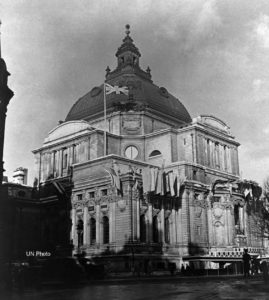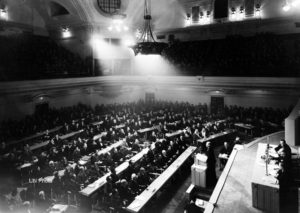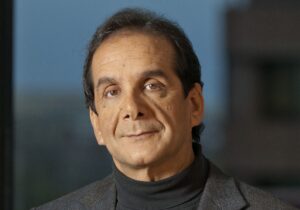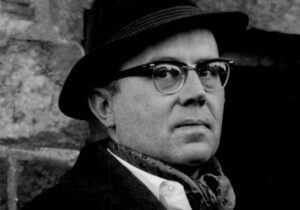“The United Nations — Its Challenge to America,” by John Foster Dulles
For the last six weeks I have been taking part in the first meetings of the United Nations. Now, on my return, I could speak merely as a bearer of good tidings. I could tell you of a difficult job of organization done by the Assembly and of proceedings of the Security Council which brought even great powers to alter their position in deference to public opinion. But I prefer to talk of what remains to be done, for that is the heart of the matter.

The United Nations will not achieve peace and security merely because those words are written into its Charter or because the Charter is now implemented by a personnel. These were necessary preliminaries, and they have been well done. But what remains is the essential, that is, to assure that our new world organization will be dedicated to some great purpose.
Alexander Hamilton said, during our Constitutional Convention, that “government ought to contain an active principle.” No doubt he had in mind such purposes as the establishment of equal justice, which the English people by the Magna Charta required of their government; or the pursuit of personal liberty, which the founding fathers made a central theme of our Constitution; or the ending of the exploitation of man by man, which the leaders of the Soviet revolution wrote into the Constitution of the U.S.S.R. It is only when men organize to advance their common good that their organization will hold together. Self-interest is a dominant human motive. It can serve as a cement which binds men together in fellowship. It can be a repellant, which sets men one against the other. The art of peaceful statesmanship is to find ways whereby the welfare of the members can be served better by working together than by working apart.
The Security Council
Let us apply that proposition to the United Nations. It has two main organs: The General Assembly and the Security Council. The Security Council is designed to settle disputes. Every political body needs such an organ. But we must not place reliance on that alone. Such an organ can never, itself, be the main organ or the main reliance for order. It can work successfully only as an adjunct to other relationships which make fellowship of positive value.
It might be thought that fear of war would, itself, always make nations want to settle their disputes, so that a settlement tribunal would suffice. It does not work that way. One reason is that it seldom seems that any particular controversy will actually precipitate war. For example, in the three cases brought before the Security Council, where the Soviet Union, Great Britain and France together were in turn the defendants, each earnestly and, I believe, sincerely contended that its action complained of could not possibly “endanger the maintenance of international peace”—to use the language of the Charter.
Of course, a succession of clashes of national interest may build up a situation which makes war an obvious danger. But nations are seldom run by men who give up the chance of present gain lest, some years after, there be the danger of loss. Almost everywhere national policies are geared to short-term considerations—the term being the term of office of the current incumbents. Furthermore, if the danger of war becomes obvious, that is only because national emotion runs so high and national prestige is so involved, that peaceful settlement is, on account of those very facts, made almost impossible.
Also, there are always in the world some virile, dynamic peoples who are not moved solely by consideration of safety and security. That to some may seem an unpleasant fact. But it is a reality to which we had better accommodate ourselves and our institutions.
Throughout the ages peace-loving people have placed their principal reliance upon fear. They have always been wrong. Fear of war or fear of risk is not enough to bring nations to reconcile their conflicting interests. It is necessary to put a positive premium on fellowship.
The first meetings of the United Nations have made it perfectly clear that the nations, at least the big nations, do not feel it very important to settle their differences. I have listened for hours to representatives on the Security Council accusing others and defending themselves. Most of the time it seemed that the members were using the Council as a forum where through propaganda and clever maneuvers they could score a national gain at the expense of others.
That is a disturbing fact. It is in marked contrast with the situation which prevailed during the war. Then the United Nations were engaged together on a great task of supreme importance to each—the defeat of common enemies. That made fellowship worth while, so much so that it would have been immediately disastrous to have sacrificed that fellowship by such quarreling as was indulged in at London. But now, with the defeat of Germany and Japan, the practical, immediate advantages of fellowship seem to have disappeared. The nations feel it again expedient to push for gains at the expense of each other and at the risk of discord.
Obviously what is needed is the resumption of common tasks so valuable that fellowship becomes worth preserving. There must be spun a web so precious that no one wants to tear it. It must be made more advantageous to agree than to disagree.
There are some who have not the spirit to face up to the task of organizing common effort for the common good. It seems a slow, hard way, and so it is. In contrast, mechanistic solutions are very tempting. The most popular of these would eliminate the so-called “veto-power” of the Permanent Members of the Security Council.
At the present time it is wholly unrealistic to talk in such terms. The Permanent Members of the Security Council have demonstrated, at their first meeting, a much greater degree of distrust than was anticipated at San Francisco. Then the Permanent Members declared that they would use the veto only sparingly and when major issues were involved. Actually, at London, the veto power was invoked three times by the Soviet Union. Once it was used, informally, in connection with the election of the Secretary General. The second time it was used to prevent the formal dismissal by the Security Council of charges against Great Britain in relation to Greece, charges which all the members but the complainant felt unfounded. It was used a third time to prevent the adoption of a resolution calling for the withdrawal of French and British troops from Lebanon and Syria, the reason being that the resolution seemed to the Soviet to be too mild. It is natural that the Soviet Union should use the veto more than any other permanent member, for it has developed few ties of fellowship with other countries. That, no doubt, explains why it was the representatives of the Soviet Union who, at the opening of the Assembly formally gave notice that no change such as the elimination of the veto could be tolerated. But the Soviet Union is not the only permanent member which is unwilling to subject its vital interests to the arbitrary disposition of the other members of the Council.
Let us not be deluded into thinking that there is a solution by the easy way of changing a few words on a piece of paper. The Security Council is not, and cannot now be made a world government acting by majority vote. It is a tool, upon which each great power keeps a restraining hand. It can operate to settle disputes only if other processes and other relationships make such settlements seem expedient. That brings us to the other great organ of the United Nations, the General Assembly.
The General Assembly
The Charter gives the Assembly enormous possibilities of developing an active principle. It can seek to advance human welfare in all of its phases—spiritual, cultural and material. It can promote basic human rights and fundamental freedoms. It can fight disease. It can help to solve the vast colonial problems. It can develop world trade. It is given almost unlimited opportunity to advance the welfare of the member peoples. Thereby it could create a fellowship of common effort which would make the parties want to settle such differences as emerged in the Security Council.

But will the Assembly take advantage of its opportunities? It will not do so merely because a power to do so is written into the Charter. It will do so only if the nations which make up the Assembly in fact endow it with a dynamic purpose.
That is the big task that still remains to be done, and it falls heavily upon the United States. In much of the world the peoples have been drained by the physical and moral strains of war. In most of the world the daily problems of keeping alive absorb the energy of the people. There are a few individuals, chiefly from small countries, who already have impressed their spirit on the Assembly. But they cannot alone supply the amount of spiritual drive that is needed to galvanize the United Nations into a positive force for human welfare. What is needed is the spiritual power which could be supplied by the American people. The success or failure of the United Nations depends upon that more than any other single factor.
Unhappily, the fact is that at this critical juncture the people of the United States have no great faith which moves them. We are in no mood to seize on the United Nations as an agency for accomplishing some great purpose in the world.
The United States representatives to the First Assembly were a so-called “instructed” delegation. We were to carry out such instructions as we might receive from the President. Actually, except for organizational matters, the delegation received no instructions. It was given no substantive task to perform, no great objective to achieve. It is true that this First Session of the Assembly was supposed to be given over primarily to tasks of organization. Thus our official position could be justified as a matter of logic. But cold logic does not restrain those who are passionately dedicated to some great purpose. If there had been anything which the American people really wanted, they would have gotten it under way at this first meeting of the Assembly. The very fact that we were so reasonable shows the low level of our faith and of our purpose. We were apathetic.
That would not have happened fifty years ago or one hundred years ago. Then the American people were imbued with a great faith. We acted under a sense of moral compulsion, as a people who had a mission to perform in the world. Our conduct was largely determined by a religious belief that every human being had a God-given possibility of spiritual development and that to realize this was man’s chief earthly aim. Accordingly we sought to organize a society which would promote the spiritual development of the individual. We wanted him to have not only spiritual freedom, but the surrounding conditions of intellectual and economic opportunity without which spiritual growth is seldom realized. That was “the great American experiment.” It was designed, not only for ourselves, but others. We sought, through conduct, example and influence, to promote everywhere the cause of human freedom. We availed of every opportunity to spread our gospel throughout the world. In those days no international conferences were held without the United States being a purposeful participant.
That mood has passed, with the result that at this critical time we may fail the world. We are, materially, playing a good part in keeping others physically alive and in helping to get their economy going again. We have, intellectually, played a good part in devising a world organization which well reflects the present political realities and possibilities. But spiritually we are lacking. We seem incapable of breathing into that organization the spirit needed to make it a living body.
Most of us, no doubt, would like to see our nation possessed of spiritual power. We had it once, but how now can we recapture it?
Faith Is Contagious
I suggest that there is no mystery about that. The way to get faith is to expose one’s self to the faith of others. Faith is a contagious thing. A strong faith, rooted in fact and reason, inevitably spreads, if contacts are provided. If, therefore, we want our faith renewed, we should resume contact with those who have had it. The Bible is the greatest book, because, as Paul pointed out, it is a story of faith. It recounts lapses from faith and their consequences, and revival and restoration. Most of all, it is the story of men and women who lived by faith and died in faith, bequeathing it to successors, who ever molded it into something finer, truer and more worthy. Our national history is also rich in the story of men who, through faith, wrought mightily. Two of the greatest were from Princeton. It was James Madison who saw the vision of a federal system and played a great part in bringing it into reality. It was Woodrow Wilson who saw the vision of a world organization and played a great part in bringing that into reality. We are, indeed, compassed about by a great crowd of witnesses.
What our people need is more contact with the great faiths of the past. That is something our schools and colleges can provide. Indeed, those who founded our older colleges did so with the primary purpose of assuring that we would always have men of strong beliefs, who would be teachers and leaders of men. They thought in terms of the Christian ministry and also, notably in the case of the College of New Jersey, of leaders in the field of statesmanship.
We have largely abandoned the idea that our schools and colleges should produce men of faith. In part, that idea has given place to a materialistic and utilitarian conception. Many of our colleges now consider that their main purpose is to teach technical skills. In part the original conception has surrendered to a feeling that it was reactionary or illiberal to carry forward the faith of our fathers. The result has not been a better faith, but a replacement of faith by apathy or cheap emotionalism.
These degenerating forces have operated on our youth long enough to alter the character of our people. We have lost our sense of purpose and our capacity to inspire and to uplift. That deficiency pervades all phases of our foreign relations. It makes us ineffective in our international dealings. It makes us impotent to breathe life into the United Nations. If in consequence, our people perish, that will merely fulfill one of those prophesies which we have found it convenient to forget.
Happily, we still have some time. How much time no one can say, but at least we need not become panicky merely because we now see realities of a kind which have always existed, but which, in the past, diplomacy used to keep concealed. On the other hand, we have no time to waste. The pattern of the future is already taking form, and the form is not a pleasing one.
So it is that I welcome this occasion to speak to this great college. For 200 years your example has influenced our nation’s past. It can influence our nation’s future. May you, I pray, work to renew in us a faith.






